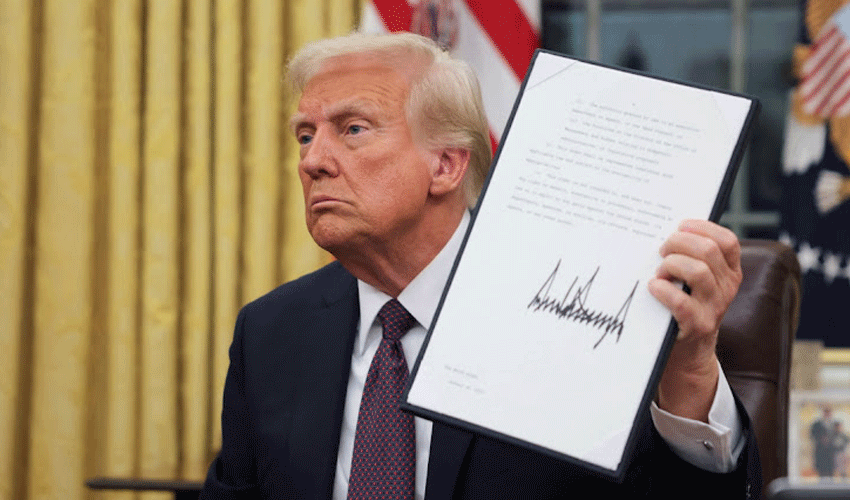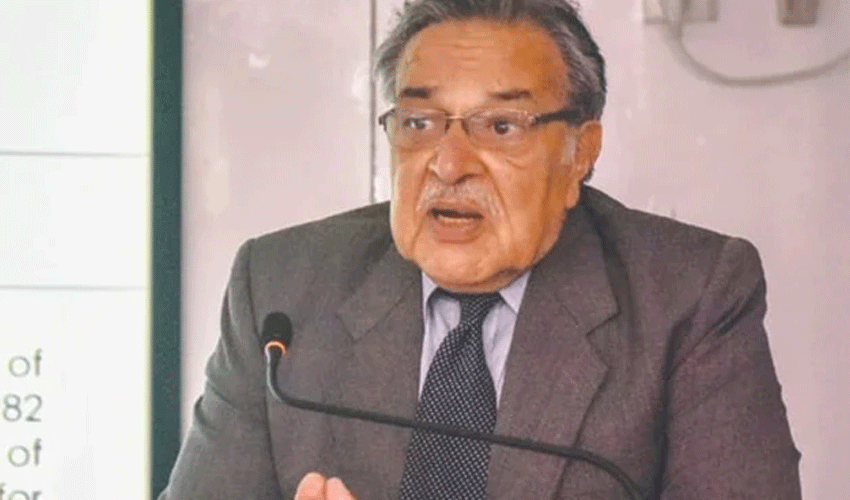The Supreme Court has resumed the hearing of multiple petitions against the Practice and Procedure Act. A full court bench of the Supreme Court, headed by Chief Justice of Pakistan (CJP) Justice Qazi Faez Isa, is hearing the petitions.
Addressing Supreme Court Bar Association President Abid Zuberi, who appeared in court on being issued a notice, CJP Isa remarked that if he was thinking this was a never-ending case, it was not, as today would be the last day.
Zuberi argued that the rules of practice and procedure could only be made by the Supreme Court, adding the “subject to law” mentioned in the Constitution did not mean parliament can make laws. He further said separate legislative powers on this matter would mean exceeding the authority, as the Constitution did not allow parliament to legislate on the matter.
Justice Ijazul Ahsan inquired from the counsel if the Supreme Court could make rules according to the existing laws only. He also asked if the court could change any legislation later if it makes rules under constitutional authority.
CJP Isa also expressed annoyance over submission of additional documents during the proceedings, and asked if the judicial system would run this way and if this happened anywhere in the world. “Don’t lower our levels this much,” he added.
The SC bar president said he wanted to refer to a decision of the New Jersey court, at which the CJP remarked that he should at least refer to the decisions of the US Supreme Court.
“You don’t want to read from the Constitution but refer to the New Jersey court’s decision,” Justice Isa remarked.
'Legislation subject to Constitution'
Article 142 has also made legislation subject to the Constitution, the CJP remarked, to which lawyer Abid Zuberi said it has been made subject to the provisions already existing in the Constitution.
Justice Jamal Khan Mandokhel remarked that this was always the case, as first an Act is made and then rules.
Abid Zuberi said the constitutional provision regarding the power to make Supreme Court rules cannot be read alone. The CJP asked him to give arguments on the constitutional clauses, while Justice Ijazul Hasan remarked that some constitutional articles talked about powers, while others clarify their limits.
Justice Ahsan said parliament can neither make rules nor legislate for making rules, adding that only the Supreme Court has the authority to change the rules within the scope of the existing law.
If the SC makes rules against the Constitution, someone will remind them to stay within the constitutional limits, the CJP said.
Justice Ahsan asked if Article 191 only determined the scope of making rules. To this, Abid Zuberi responded that Article 191 gave the Supreme Court the powers to make rules.
Justice Mandokhel remarked that if the authors of the Constitution had to give complete authority to the Supreme Court, they would have clearly written that. He added that if any regulation will be against the Constitution, it will be automatically nullified.
Article 191 says Supreme Court regulations can be made through legislation also.
Supreme Court 'mistakes'
The CJP said to the lawyer they couldn’t understand what his issue with the law was. Before the world points a finger at us over Article 184(3), he would do it himself, adding if the court makes a mistake it should rectify it too. “If we don’t rectify our mistake, can parliament do that?”
Justice Mazahar Naqvi asked why only Supreme Court rules had been restricted and not regulations of high courts or Shariat Court. Justice Ahsan remarked that high courts are authorized to make their own practices and procedure.
Even if today the Supreme Court makes its own rules, nobody can object to it, Abid Zuberi argued. Justice Athar Minallah told the lawyer he has still not been able to clarify how the Act affects basic rights. If the Supreme Court does not provide access to justice, can parliament not legislate about it, he asked.
CJP Isa then asked if the use of Article 184(3) in Pakistan has been right or wrong. Zuberi remarked it has been both right and wrong. He further said that if the right to appeal has to be given then the Constitution would have to be amended, adding the authors of the document have not given this right in Article 184(3).
If today a judge says under the article that a party has been banned, would the matter end there, the CJP asked. Shouldn't there be any solution other than revision, he questioned. “According to me, parliament’s intention was good, and it legislated with good intentions,” he added.
Justice Ahsan remarked that if the doors for parliament were opened, it would interfere in every issue of the Supreme Court. The CJP asked if parliament wants to do something good why it should be trampled on?
CJP's prerogatives
Justice Minallah remarked that if someone filed a review petition once under Article 188 they could not appeal against it under the Act. He also questioned if cases should be left to the prerogative of a chief justice.
Petitioner Umer Sadiq’s lawyer Adnan Khan argued that the Act reduced the powers of the chief justice of Pakistan, adding the law can lead to a dead end.
Petitioner Shahid Rana maintained that the Act gave the right to appeal, which usually went to other judges. If 15 judges decided a case, where the appeal will go, he asked. “To God,” the CJP responded.
If the Supreme Court exceeds its authority, it cannot be rectified through legislation, the CJP remarked. The Supreme Court should hear cases of public interest and not of some specific interests under Article 184(3), the lawyer remarked.
The CJP and lawyer Imtiaz Siddiqui then got into a heated argument. “If you don’t want to listen to us, we will not present arguments,” the counsel remarked, adding he was told he would be heard after the attorney general for Pakistan.
CJP Isa responded that this could have been said respectfully also. “You should look at your own attitude also; this is the reason Khawaja Tariq Rahim has refused to appear in this court,” Siddiqui replied.
The PML-Q lawyer maintained the Act did not reduce the constitutional powers of the Supreme Court. He added that the case itself accepted that parliament can legislate.
How it is possible that parliament is authorized to legislate on the Supreme Court rules by writing “subject to law”, asked Justice Ayesha Malik.
Legislation related to the Supreme Court emanated from Article 142, the counsel remarked, adding the Constitution did not give absolute powers to parliament to legislate regarding the court.
The lawyer remarked that the Supreme Court had in a 2010 case put its rules on a very high pedestal.
Expansion of scope
Zahid Ebrahim said Article 142 gave powers to legislate, adding the Practice and Procedure Act expanded the authority of the Supreme Court.
If parliament removes Article 184(3) through a constitutional amendment, it will start a new debate, the CJP commented.
Justice Ahsan argued that parliament has authority to expand the scope of the current legislation, so how was the scope of the law expanded by giving the right? How can legislation add to the jurisdiction of the Supreme Court? Justice Ahsan asked.
Justice Shahid Waheed asked if the jurisdiction of the SC can be extended by an Act of parliament or if it required a constitutional amendment. Can other provisions of the Constitution also be changed without a constitutional amendment, he further questioned.
According to the Constitution, parliament can increase the powers of the Supreme Court, Justice Ahsan said.
This message should not go from the court that laws depended on the wishes of the chief justice, as such an impression and message would be disastrous. “I’m a servant to the Constitution answerable to God,” he remarked.
After this law, who will be the master of roster, asked Justice Muneeb Akhtar. Zahid Ebrahim responded this will be decided by a committee.
The judge said if the committee decides, will parliament become the master of roster? The rules talk about the chief justice fixing benches, CJP Isa said.
If a person has the power to constitute benches, he can affect the outcome of the case, Justice Mansoor Ali Shah remarked. If one person can influence the outcome, three can too, Justice Akhtar said.
The law and Constitution were not based on the whims and wishes of the chief justice, CJP Isa said, adding this is against the independence of the judiciary and law.



























